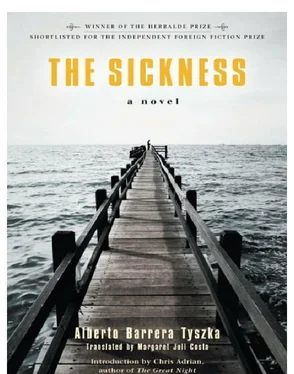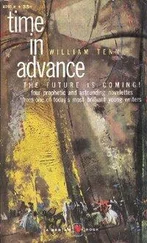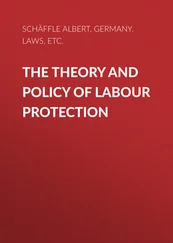“The only foolish thing I can do is to die, and I’m doing that right now.”
Andrés doesn’t know what else to say. He drops the book onto the bed and continues stroking his father’s head. They both stay like that for a few moments, until Andrés decides to take a risk.
“Why did you never tell me?”
“About what?”
“About Inés Pacheco.”
His father sits up and looks at him. He seems more disappointed, even angry, than surprised. Despite his weak state, he maintains a haughty, almost severe mien.
“I met her. I went to see her,” says Andrés.
And then the old man slowly deflates, as if that sudden burst of spirit had simply emptied out through some secret hole. He gives a snort and slumps back onto the bed. Then he closes his eyes, as if he didn’t want to hear any more.
“Didn’t she tell you? Didn’t she mention it?”
His father remains sunk in his own thoughts.
“Does she know what’s happening to you, that you’re ill?” Andrés continues asking questions even though his father refuses to answer.
After a few moments of silence, Andrés also lets himself slide very slowly onto the bed, so that he’s lying beside his father. Then he, too, lies staring up at the ceiling. They probably both just wish it would end, that it was over. Death is preferable to pain. Illness is a very bitter toll to pay, a tax so capricious that it can make death the object of all our final desires.
“I smell bad,” his father says suddenly, still with his eyes closed.
He’s right, but Andrés doesn’t respond. Every illness produces inside the body its own particular distinguishing marks.
“It’s as if I’d already started to rot.”
Andrés doesn’t look at him either. He doesn’t dare.
“It’s just that you’re very depressed, Dad,” he whispers, a lump in his throat.
“Can’t you smell it? I smell strange, of ammonia and things. Even when I’ve showered, I still smell.”
Andrés gently reaches out and takes his father’s hand in his. He closes his eyes, as if he wanted to close his memory too, as if he didn’t want it to hold on to that image.
“I’m desperate,” he confesses. “There’s nothing I can do. I don’t know what to do.”
The silence is a knife plunging into the skin of the afternoon. Neither of them dares now to open his eyes.
“What can a man do when, suddenly, one morning, he’s told that he has only three or four weeks left to live?”
This is how the second workshop session begins. Two new participants have joined them: a very fat woman who has difficulty breathing, and a young man of about thirty, who looks healthy enough, but is clearly feeling uneasy and nervous. Roger, the same smiling facilitator from the first session, quickly gets the group involved.
“Think about yourselves for a moment. There may be people among us today who are in a similar situation. It wouldn’t be the first time, I can assure you. I’ve led a lot of these workshops and there’s often someone who has had just such an experience. But, if not, it doesn’t matter. Just take a moment to do this mental exercise. Imagine that, at this very moment, a celebrated doctor, a notable specialist comes to you and says: sir, madam, miss, young man, I regret to inform you that you have only one month to live. What would you do?”
Merny thinks of Javier Miranda. She thinks of his age, of the pain he’s in, of his terrible pallor. He seems to grow daily more absent. What has he done with these final days of his existence? Has he used them well or has he wasted them? Who can say? Who can judge?
“Obviously, it’s not easy.” Roger again walks round the circle. “We don’t always react the way we think or believe we’ll react. Perhaps, after receiving a piece of news like that, we might waste a whole week simply digesting, believing and accepting it. The big difference between human beings and other animals is that we’re the only ones who know we’re going to die. A dog doesn’t know. A cat has no idea, cannot even imagine such a thing. On the other hand, we can. And we spend our lives thinking about it. Suffering and enduring that knowledge. More than that, there are people who spend their whole lives trying to avoid what they know, trying not to think about it. There are people who can only live when they forget they’re going to die. That’s why I’m asking everyone to do this exercise. Right, you’ve got four weeks left to live. What do you want to do with that time?”
When Javier Miranda found out the truth, he spent quite a long while trying to grapple with that question. He thought about his son, he thought about Mariana and his grandchildren, he thought about a long-dreamed-of trip to the Amazon, he thought, too, about Inés Pacheco. But he and Inés had long ago made a pact. Moreover, the idea of setting up a series of goals before he died became mixed up with the clear sense that, gradually and unstoppably, his death would become something ever more public. That is another of the consequences of being ill: the private agony becomes a collective ceremony. The result of this was that Javier Miranda began, instead, to want to withdraw, to hide away, to become more distant, more absent. As the days passed and the tests and treatments and doses of medicine increased, so any pleasure or delight he might feel diminished. This wasn’t a selective deterioration. At that point, everything was lost. There are no half measures when one says goodbye.
“What about taking a trip somewhere. That’s a possibility. That’s a great idea.” Roger moves from one to another of the participants, searching out and sharing answers. “So where would you like to go?”
“New York,” murmurs an old lady.
“New York, very good.” He moves on, and finds himself in front of the very thin, very pale young man. “And what about you, Rodolfo, what would you do?”
“If I was told I only had four weeks left to live, I’d do everything I could to find a cure, to live longer.”
“What for example?”
“I’d go and see one of those doctors who cure by laying their hands on you, I’d try natural medicine, I’d pray to María Lionza, I’d eat roots, I’d do whatever they told me to.”
“Very good. Thank you, Rodolfo,” he says, as he moves on, keeping a close watch on each member of the group. “Who else would like to say something?” He stops next to a man in his sixties, with a bandage over his eyes. “Ah, Don Esteban. What about you? What would you do?”
“I’d do it with a Chinese woman,” he says and roars with laughter.
Some of the other members of the group laugh too, others keep silent and exchange glances that presage future days of tittle-tattle.
“Well, I’ve never been with a Chinese woman. I mean it.”
“I don’t doubt it, Don Esteban. We believe you. That’s perfectly fine.” He stops suddenly in front of Merny. He bends toward her, resting his hands on his knees. His tone is warmer. “And what does Merny have to say? What would you do?”
Merny feels awkward. The whole group is looking at her and that frightens her. She feels as if she had done something wrong, or is about to. She’s embarrassed. She feels that what she has to say is wrong, stupid, irrelevant.
“So, Merny, you have four weeks left to live. What are you going to do with that time?”
“Take my son to Mérida,” she blurts out nervously, not even daring to look up.
“Dr. Miranda!”
Karina is the first to hear him. Or so, at least, she thinks. Dr. Miranda, who is walking by her side, appears not to react, but walks on as if he’d heard nothing, absorbed in his own thoughts. So much so that even Karina wonders if she really did hear it or perhaps imagined it. Then she thinks that’s impossible, you don’t imagine noises.
Читать дальше












